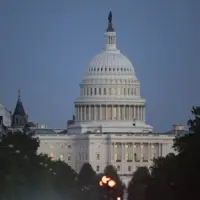
(WASHINGTON) — One of the biggest impacts of the government shutdown is about to hit tens of millions of the poorest Americans hard: the halting of a critical food assistance program.
Several states are now warning they will be forced to suspend Supplemental Nutrition Assistance Program benefits come Nov. 1 if the shutdown continues.
SNAP, often referred to as “food stamps,” serves roughly 42 million low-income Americans. The program, run by the USDA Food and Nutrition Service, issues electronic benefits that can be used like cash to purchase food.
Texas is now warning its millions of recipients that all November SNAP benefits will be halted if the shutdown continues past Oct. 27.
Pennsylvania officials say they will also not be able to distribute SNAP benefits if the shutdown — now in its 21st day — continues.
“Because Republicans in Washington DC failed to pass a federal budget, causing the federal government shutdown, November 2025 SNAP benefits cannot be paid,” an alert on the state’s Department of Human Services website reads.
Other states such as Minnesota and New York, are issuing similar warnings — saying benefits are “at risk” or “may be delayed” if the shutdown continues.
SNAP has traditionally been entirely federally funded, but is administered by states. That means the shutdown’s impact on SNAP and when benefits will start to dry up will vary state by state.
Earlier this month, the Special Supplemental Nutrition Program for Women, Infants and Children — commonly known as WIC — received $300 million to help support the program amid the shutdown. The White House said it would use tariff revenue to pay for WIC benefits, which help more than 6 million low-income mothers, young children and expectant parents get nutritious foods.
“We welcome efforts to keep WIC afloat during the shutdown, but families need long-term stability, not short-term uncertainty. We still don’t know how much funding this measure provides, how quickly states will receive it, or how long it will sustain operations. There is no substitute for Congress doing its job,” National WIC Association CEO Georgia Machell said in a statement.
In a letter to state health officials earlier this month, Ronald Ward — the acting head of SNAP — warned that “if the current lapse in appropriations continues, there will be insufficient funds to pay full November SNAP benefits for approximately 42 million individuals across the Nation.”
This has already been a tumultuous few months for SNAP. President Donald Trump’s megabill already cut the program by an estimated $186 billion over 10 years.
Copyright © 2025, ABC Audio. All rights reserved.














